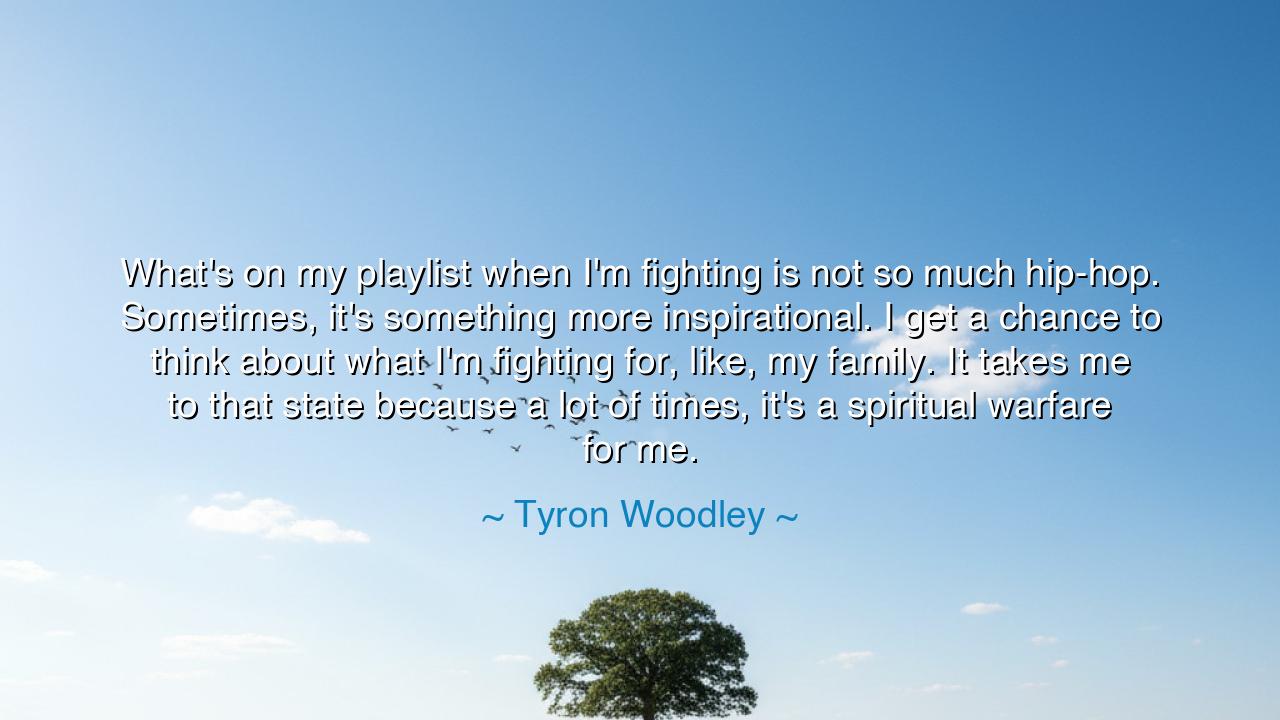
What's on my playlist when I'm fighting is not so much hip-hop.
What's on my playlist when I'm fighting is not so much hip-hop. Sometimes, it's something more inspirational. I get a chance to think about what I'm fighting for, like, my family. It takes me to that state because a lot of times, it's a spiritual warfare for me.






In the heart of battle, where body meets destiny, Tyron Woodley speaks a truth as old as war itself: “What’s on my playlist when I’m fighting is not so much hip-hop. Sometimes, it’s something more inspirational. I get a chance to think about what I’m fighting for, like, my family. It takes me to that state because a lot of times, it’s a spiritual warfare for me.” These words rise from the soul of a warrior — not one who fights for glory alone, but one who has learned that every conflict is first waged within. For Woodley, the cage is not merely a place of combat, but a temple of the spirit, and his music becomes prayer — rhythm as remembrance, melody as meditation.
The ancients would have understood this well. The warriors of Sparta and the samurai of Japan both entered battle not with chaos in their hearts, but with ritual. They sharpened their minds as much as their swords. Music, for them, was not a distraction but a summons of spirit — the drum that awakened courage, the chant that silenced fear. So too does Woodley’s playlist become a sacred invocation. He does not seek the noise of rage, but the sound of meaning — songs that remind him why he stands, who he stands for, and what his struggle signifies. His arena is one of fists and fire, yet his heart bows to spiritual warfare, the unseen struggle between despair and devotion, between self-doubt and faith.
When he speaks of family, he evokes the truest source of strength. It is easy to fight for fame, but it is divine to fight for love. The man who remembers his mother’s sacrifice, his children’s faces, his ancestors’ hopes — such a man cannot fall easily, for he carries more than his own life into battle. He becomes a vessel for generations, a living continuation of all who came before. In this, Woodley joins the lineage of warriors like Hector of Troy, who fought not for conquest but for the sanctity of home. As Homer wrote, “And the heart within me swells, for I have learned to fight for those I love.”
The phrase “spiritual warfare” is no mere metaphor. It is the recognition that every fight — whether in the ring or in the soul — is a contest between higher and lower forces. The body may strike, but the will must guide it. Fear, pride, temptation, and doubt lurk in every corner of the human heart. To overcome them, one must prepare not only with training but with truth. Woodley’s choice of inspirational music is not weakness but wisdom: he tunes his heart to faith before he tunes his muscles to violence. Like the priests of old who chanted before lighting sacred fires, he prepares his spirit for war with sound that sanctifies.
Think also of King David, the warrior poet, who entered battle not with the boasting of giants but with the song of the soul. When he faced Goliath, he sang to the Lord, and his courage flowed not from rage, but from belief. In his psalms, he wrote of both warfare and worship, knowing that the two are entwined. Tyron Woodley stands in this same lineage — the modern descendant of those who understand that victory is born from inner peace, and that strength without soul is but noise.
His words also carry a warning for our time. Too many enter life’s battles without knowing what they are fighting for. They fight for approval, for wealth, for the hollow roar of the crowd. But when such fighters fall, they fall easily, for they stand upon shifting sand. The one who fights for love, for purpose, for something sacred — that one cannot be broken. His wounds become wisdom, his scars become scripture.
Therefore, the lesson is clear: before you fight, remember your cause. Before you act, ground yourself in meaning. Whether your arena is the ring, the workplace, or the soul’s own battlefield, take a moment to find your rhythm — your inner song of courage. Let your actions rise not from anger, but from purpose. Let every struggle you face become not just survival, but spiritual warfare — the sacred work of aligning your strength with your truth.
And when you enter your own fight — whatever form it takes — carry Woodley’s wisdom with you. Choose the music that reminds you who you are. Fight not for applause, but for peace. For in that quiet, disciplined fire lies the power of all true warriors: to conquer not the world, but themselves.






AAdministratorAdministrator
Welcome, honored guests. Please leave a comment, we will respond soon